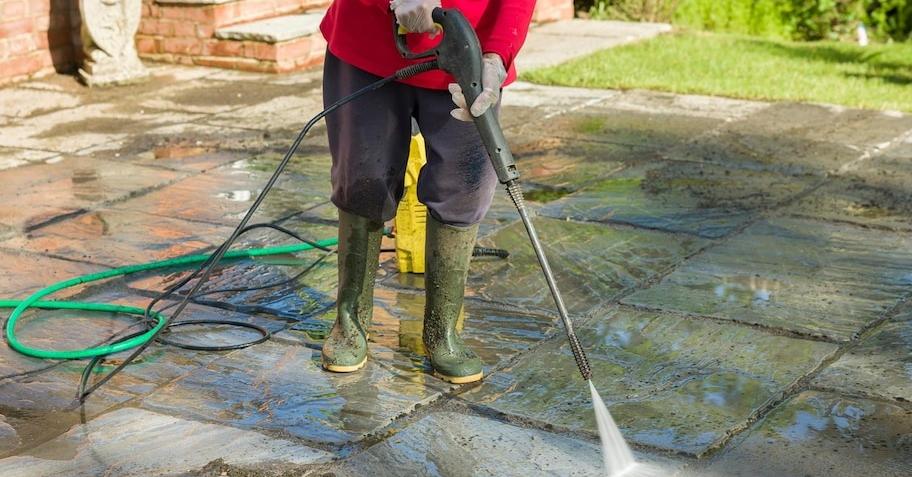Two powerful methods often come into play when revitalizing exterior surfaces: pressure washing and power washing. Both techniques can transform dirty, weathered surfaces into gleaming showcases. Still, they have key differences that make them better suited for specific tasks. In this guide, we’ll delve into the nuances of pressure washing and power washing, helping you make an informed choice for your next cleaning project.
Understanding Pressure Washing
Pressure washing is a popular method for removing dirt, grime, and mildew from surfaces using high-pressure water. The equipment typically consists of a pressure washer that utilizes water pressure to dislodge particles from various surfaces. Pressure washing is highly effective for cleaning concrete driveways, sidewalks, and decks.
Exploring Power Washing
Power washing takes exterior cleaning further by introducing heated water into the equation. The power washer heats the water, breaking down tough stains, grease, and oil. This method is particularly valuable for industrial and commercial settings, where stubborn grime requires more cleaning power.
Critical Differences Between Pressure Washing and Power Washing
Temperature Variance: One of the primary distinctions between the two methods is temperature. Pressure washing employs cold water, making it suitable for most residential applications. On the other hand, power washing uses hot water, making it the go-to choice for dealing with stubborn, deeply ingrained stains like grease and oil.
Cleaning Capabilities: While pressure washing is excellent for removing dirt, mold, and mildew, power washing’s heated water provides an extra edge when tackling heavy-duty cleaning. Grease, oil stains, and industrial residue yield more readily to the power of hot water.
Surface Versatility: Pressure washing is safer for delicate surfaces such as wood and painted surfaces. Higher temperatures of power washing can potentially damage these materials. Thus, pressure washing is preferred when cleaning residential siding, wooden decks, and fences.
Efficiency and Speed: Power washing’s heated water enhances efficiency, making it ideal for large-scale cleaning projects. Industrial and commercial spaces benefit from power washing’s ability to swiftly and effectively clean expansive areas.
When to Choose Pressure Washing
Pressure washing is the method of choice for various scenarios:
- Residential cleaning: Siding, decks, fences, and patios.
- Delicate surfaces: Wood, painted surfaces, and surfaces prone to heat or excessive pressure damage.
- General cleaning needs: When dealing with regular dirt, dust, and mildew.
- Environmental considerations: Pressure washing consumes less energy and water than power washing.
When to Choose Power Washing
Power washing is indispensable when dealing with:
- Industrial and commercial spaces: Parking lots, factories, warehouses, and heavy machinery.
- Stubborn stains: Grease, oil, industrial residues, and deep-seated grime.
- Rapid cleaning: Situations where time is of the essence due to large surface areas.
- Surfaces that can withstand heat and pressure: Concrete, stone, and tough materials.
Safety Considerations for Both Methods
Regardless of whether you choose pressure washing or power washing, safety should always be a priority:
- Wear appropriate protective gear: Goggles, gloves, and proper footwear.
- Maintain safe distances: To prevent accidents, keep a reasonable distance from surfaces and other people.
- Environmental precautions: Manage runoff responsibly and use eco-friendly cleaning agents when possible.
DIY vs. Professional Services
While pressure washing can often be a feasible DIY project, power washing requires more expertise due to the introduction of heated water and the potential hazards. Hiring professionals for power washing in complex scenarios ensures optimal results and minimizes risks.
Factors to Consider When Choosing a Method
Several factors should guide your choice between pressure washing and power washing:
- Nature of the cleaning project: Residential, commercial, or industrial.
- Surface material and sensitivity: Delicate surfaces vs. tough, durable materials.
- Severity of stains or grime: Mild dirt vs. stubborn, deep-seated stains.
- Available equipment and resources: Can you access a power washer and the necessary safety gear?
Conclusion
In the pressure washing vs. power washing debate, the best method depends on your unique needs and the surfaces you’re dealing with. By understanding the differences between these two techniques, you can make an informed decision that leads to outstanding cleaning results. Whether rejuvenating your home’s exterior or tackling industrial grime, the right choice will leave your surfaces fresh and renewed.
Special thanks to Northwest Power Wash LLC






